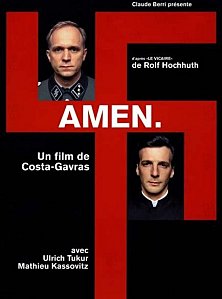
AMEN
March 1st 2003
Amen is the title of the film by Greek director Costa- Gavras. Costa- Gavras made his name in cinema with an impressive range of films on political issues. His drama about the rule of the Greek generals, Z (He Lives), won the Oscar for Best Foreign Language Film of 1969 and was greeted the world over as showing how a film could offer insights into social struggles. Other films from the seventies include The Confession and State of Siege. His 1982 drama about oppression by the Pinochet regime in Chile, Missing, starred Jack Lemmon and Sissy Spacek and was also Oscar-nominated.
His intention in making Amen was to contribute to the continuing discussions about the role of the Catholic Church in defending the rights of the Jews, especially in Nazi Germany and during World War II. The controversies, which are frequently discussed in the Catholic media, centre on Pope Pius XII with arguments about his seeming public inaction and his and the Church's assisting Jews behind the scenes.
Because the focus on Pius XII has been persistent, Costa- Gavras's film is still timely. What has annoyed many commentators is that Amen is a film version of Rolf Hochhuth's play, The Deputy, performed first in the 1960s. At the time, critics were strong in declaring that Hochhuth had taken a biased stand against Pius XII and that his fictional and weakly-researched treatment of the serious issues was offensive. This has been the presumption of critics of the film who were quick to denounce it earlier in 2002, especially when it was screened in competition at the Berlin Film Festival and then given general release in France. Particular criticism was made of the advertising campaign (which is not the same as the film itself) for its logo of a cross combined with a swastika. The French Bishops condemned the advertisements.
But what of the film itself? A number of elements need to be taken into consideration. As a film, Amen will not draw the crowds. Many critics were harsh on it in Berlin, including some Catholic reviewers, because its style is a throwback to the 60s. It was considered 'old-fashioned' and lacking in dramatic impact. Another difficulty is that it is one of a number of films made these days with funding from all over the European Union where the producers decide that the film is to be made in English as the most widely understood language. The result is a screenplay that sometimes sounds archaic in its expressions. And, with a cast from different countries, the English accents vary considerably. Both these elements can alienate audiences.
As regards the content of the film, Costa- Gavras has modified Hochuth's attack on Pius XII. The central criticism is still there but Pius XII is not isolated from other church and civic leaders of those times. The film indicates that German Protestant leaders were slow to believe information coming out of the concentration camps. The Papal Nuncio in Berlin wanted proof of the claims of genocide, suspicious that the revelations were being made up by a member of the Nazi party who had been involved in developing the gas chambers' technology. Church people feared that the claims were a set-up. Swedish diplomats and US diplomats in Italy and the Vatican are also shown as holding back. Pius XII opts not to denounce the atrocities in his Christmas message of 1943, believing that he is saving others, especially Church officials and ordinary people, from harsh Nazi reprisals.
This has been the stuff of controversy now for more than fifty years.
Where the film is worth seeing is in its portrayal of the German scientist who comes to realise what cruelty is being perpetrated against the Jews and who tries, generally in vain, to make his message known so that the killing will be stopped. Also forceful is the fictional character of a young Roman Jesuit who works in the Papal Nuncio in Berlin and uses his family connections in the Vatican to try to persuade the Pope and the Curia of what is going on and for the Pope to speak out.
The final ironies of the plot reflect some of the injustices concerning Nazi personnel after the war. The decent whistleblower is condemned as a war criminal. The Jesuit opts to identify with the Jews and be executed in the camp with them. The commandant does a deal with a church official to escape to Argentina.
The study of history is not always comforting and the sins of the past, as Pope John Paul II has constantly reminded us, have to be acknowledged, confessed and reparation made. While the controversy about Pius XII and what he did and did not do will continue to be debated, Amen is not an attack on the Church as such, but a drama that is critical with the luxury of hindsight.